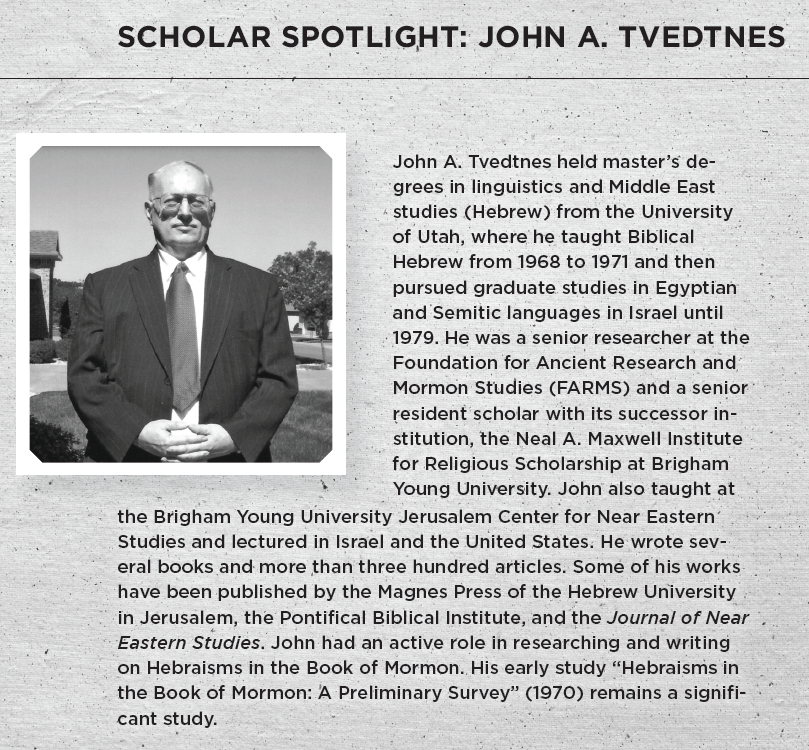Adverbial Phrases Using "With"
Donald W. Perry, “Adverbial Phrases Using With,” in Preserved in Translation: Hebrew and Other Ancient Literary Forms in the Book of Mormon (Provo, UT: Religious Studies Center, Brigham Young University; Salt Lake City: Deseret Book), 111‒14.
"filled with joy" (1 Nephi 5:1)
In English, adverbs are sometimes created by adding -ly to a word: peaceful becomes peacefully, for example. In Biblical Hebrew, such adverbs may be created by attaching a preposition to the word, thus creating a combination such as “with peace.”[1] This construction is also found in the Book of Mormon.[2] Here are several examples:
“with all diligence” (3 Nephi 5:3), rather than diligently
“with compassion” (Alma 27:4), rather than compassionately
“with joy” (1 Nephi 5:1), rather than joyfully
“with much harshness” (1 Nephi 18:11), rather than very harshly
“with patience” (Alma 38:4), rather than patiently
“with sorrow” (Jacob 4:3), rather than sorrowfully
“with power” (2 Nephi 33:11), rather than powerfully
Such usage, rather foreign to English if employed frequently (and sometimes unnatural even when used in isolation), suggests a literal translation from Hebrew. John Tvedtnes points out that while the Book of Mormon contains many examples of this Hebraic adverb form, it “contains but few examples of true English adverbs.”[3]
In our day, scholars and researchers aided by computers can conduct various corpus linguistic studies of large texts such as the Book of Mormon in order to identify and analyze morphological and lexical forms that would be difficult to research any other way. For example, Dr. Monte Shelley, from Brigham Young University’s WordCruncher team (www.wordcruncher.com), conducted several computerized studies of the Book of Mormon corpus to assist me as I was writing this book. He utilized the computer to locate examples of cognate verb-object phrases in the Book of Mormon, such as “I have dreamed a dream” (see chapter 22); he also located multiple instances of the emphatic first-person pronoun, including the expression “I, even I” (see chapter 27).

As a side note, over the years I have conducted numerous corpus linguistic studies on the Hebrew Bible and the Dead Sea Scrolls as I have researched various aspect of the scriptures. Many of these computer-assisted studies have been published as articles or books. We can look forward to seeing technology harnessed in this way to increasingly expand our knowledge of adverbial forms and other Hebraisms in the Book of Mormon.
Notes
[1] “Much more frequently the adverbial notion is expressed by a substantive preceded by a preposition, especially [bet] and [lamed].” Joüon and Muraoka, Grammar of Biblical Hebrew, 331.
[2] See Tvedtnes, “Since the Book of Mormon Is Largely the Record of a Hebrew People,” 64; and Ricks, “Converging Paths,” 400.
[3] See Tvedtnes, “Hebraisms in the Book of Mormon: A Preliminary Survey,” 56.
